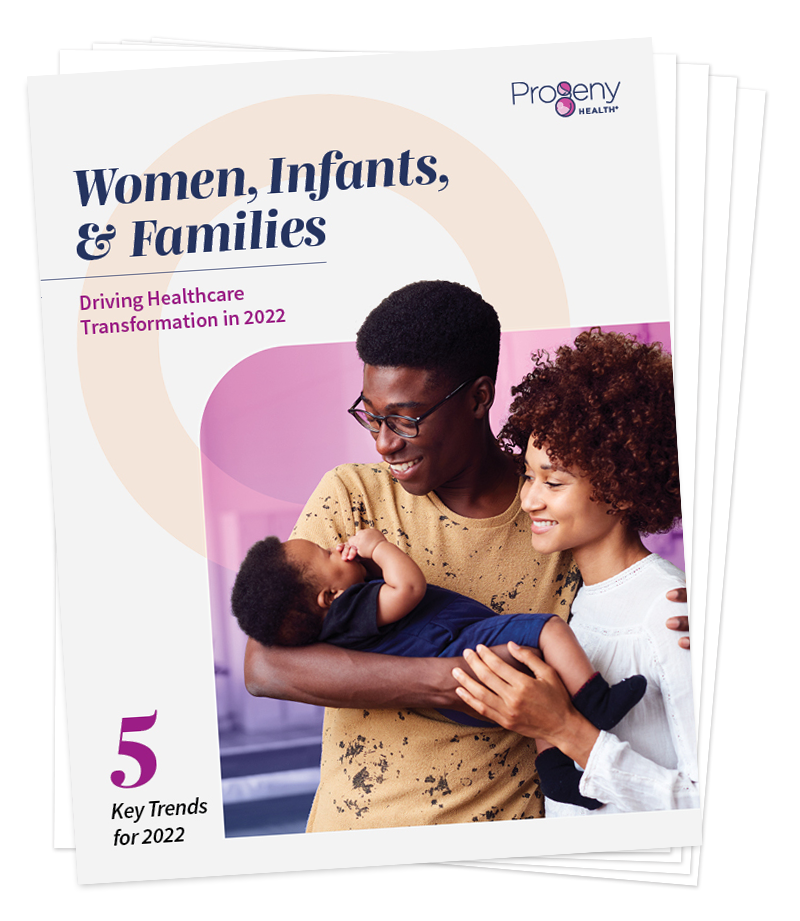 Filed Under: Infant Health | Maternal Health | Tips, Guides, & Trends
Filed Under: Infant Health | Maternal Health | Tips, Guides, & TrendsWomen, Infants & Families Will Drive Healthcare Transformation in 2022

The pandemic fundamentally altered the relationship between members, providers, and plans. Providers implemented telehealth practically overnight, state Medicaid programs saw enrollments surge and their coffers suffer, and health inequity was thrust into the national spotlight.
Unexpected was the degree to which women, infants, and families would shape the transformation of healthcare. Nearly every health-related sector was impacted by COVID-19, and unprecedented social and political forces continue to shape healthcare policy. Nowhere is this more evident than in maternal and infant health and family wellbeing.

Maternity patients, infants, and families drive a significant degree of healthcare utilization in normal times and during a pandemic their needs could not be postponed. With the post-lockdown reshuffling of the labor market, employers now realize how critical family benefits are to their workforce. Already in their prime years for starting families, by 2025 Millennials will account for 75 percent of the American workforce.
In this climate of rapid change, ProgenyHealth has identified five critical areas as trends to watch in 2022:
- Maternal Health: Saving money with empowered moms
America’s maternal mortality and preterm birth rates are among the highest in the developed world, especially among Black and Native American women, regardless of their income or education level. Health plans and the government are rethinking the basic format for prenatal and postpartum care that has survived since the 1900s by implementing programs that support an end-to-end approach to maternal and infant health. - Medical Benefits: The business case for family wellbeing
With moms leaving the workforce during the pandemic and unemployment at its lowest in 50 years, the economic value of wellbeing has become an important part of the business model. As a result, employers are boosting family benefits and behavioral health offerings to better support families. - Medicaid: Maternal health delivering in a market of flux
While states are still recovering from the economic aftermath of COVID-19, the American Rescue act is driving a new push to increase postpartum coverage and better manage maternal and infant health. In 2022, managed care organizations bidding on state Medicaid RFPs will increasingly have to demonstrate how they will address maternal and infant health for that state’s population. - Digital Transformation: The emerging market for women’s health technology
While much of our life went into COVID lockdown in ’20 and ’21, digital transformation continued at warp speed. In 2022, digital technology will embrace maternal and infant health by introducing innovative apps that improve women and infant health outcomes. ProgenyHealth has introduced a maternity care management program that integrates digital convenience with the clinical interventions needed to drive successful outcomes from high-risk pregnancies and preterm birth. - Health Equity: Shifting from commitment to action
Last year, plans, providers, and policymakers all took notice of the social cost of health inequity. In 2022, these stakeholders are connecting the dots as the healthcare industry shifts from commitment to action. ProgenyHealth has developed a detailed framework for reducing systemic bias, SDOH, and health inequities on mothers and their infants.
2022 promises to offer a gradual return to “normal” while ushering in a transformed medical landscape. Maternal health, family benefits, women’s tech, specialized Medicaid partners, and health equity will accelerate costs savings, efficiencies, and better outcomes. ProgenyHealth is proud to play a vital role in this transformation.
Download the full report to get more details on how women, infants, and families will drive healthcare transformation in 2022.






 Prev
Prev